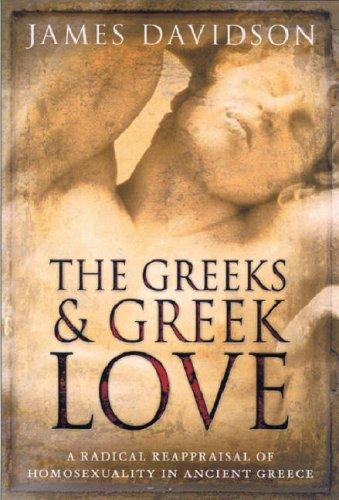Copertina rigida, 656 pagine
lingua Undetermined
Pubblicato il 29 Novembre 2007 da Weidenfeld & Nicolson, Orion Publishing Group, Limited.
a radical reappraisal of homosexuality in ancient Greece

Copertina rigida, 656 pagine
lingua Undetermined
Pubblicato il 29 Novembre 2007 da Weidenfeld & Nicolson, Orion Publishing Group, Limited.
For nearly two thousand years, historians have treated the subject of homosexuality in ancient Greece with apology, embarrassment, or outright denial. Now classics scholar James Davidson offers a brilliant, unblushing exploration of the passion that permeated Greek civilization. Using homosexuality as a lens, Davidson sheds new light on every aspect of Greek culture, from politics and religion to art and war. With stunning erudition and irresistible wit–and without moral judgment–Davidson has written the first major examination of homosexuality in ancient Greece since the dawn of the modern gay rights movement.
What exactly did same-sex love mean in a culture that had no word or concept comparable to our term “homosexuality”? How sexual were these attachments? When Greeks spoke of love between men and boys, how young were the boys, how old were the men? Drawing on examples from philosophy, poetry, drama, history, and vase painting, Davidson provides fascinating answers to …
For nearly two thousand years, historians have treated the subject of homosexuality in ancient Greece with apology, embarrassment, or outright denial. Now classics scholar James Davidson offers a brilliant, unblushing exploration of the passion that permeated Greek civilization. Using homosexuality as a lens, Davidson sheds new light on every aspect of Greek culture, from politics and religion to art and war. With stunning erudition and irresistible wit–and without moral judgment–Davidson has written the first major examination of homosexuality in ancient Greece since the dawn of the modern gay rights movement.
What exactly did same-sex love mean in a culture that had no word or concept comparable to our term “homosexuality”? How sexual were these attachments? When Greeks spoke of love between men and boys, how young were the boys, how old were the men? Drawing on examples from philosophy, poetry, drama, history, and vase painting, Davidson provides fascinating answers to questions that have vexed scholars for generations. To begin, he defines the essential Greek words for romantic love–eros, pothos, philia–and explores the shades of emotion and passion embodied in each. Then, exploding the myth of Greek “boy love,” Davidson shows that Greek same-sex pairs were in fact often of the same generation, with boys under eighteen zealously separated from older boys and men.
Davidson argues that the essence of Greek homosexuality was “besottedness”–falling head over heels and “making a great big song and dance about it,” though sex was certainly not excluded. With refreshing candor, humor, and an astonishing command of Greek culture, Davidson examines how this passion played out in the myths of Ganymede and Cephalus, in the lives of archetypal Greek heroes such as Achilles, Heracles, and Alexander, in the politics of Athens and the army of lovers that defended Thebes. He considers the sexual peculiarities of Sparta and Crete, the legend and truth surrounding Sappho, and the relationship between Greek athletics and sexuality.
Writing with the energy, vitality, and irony that the subject deserves, Davidson has elucidated the ruling passion of classical antiquity. Ultimately The Greeks and Greek Love is about how desire–homosexual and heterosexual–is embodied in human civilization. At once scholarly and entertaining, this is a book that sheds as much light on our own world as on the world of Homer, Plato, and Alexander.